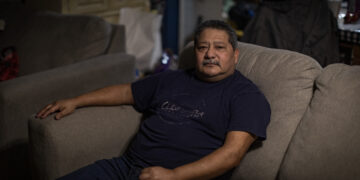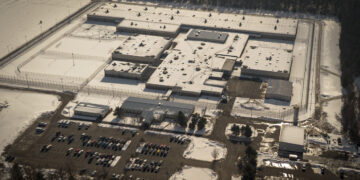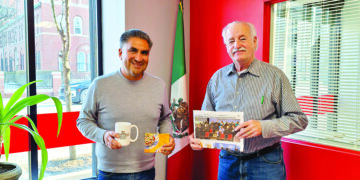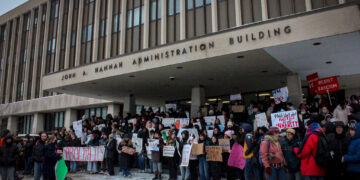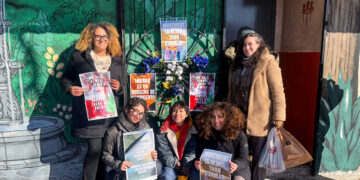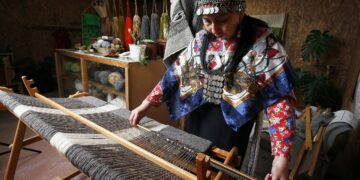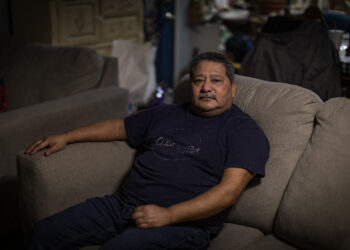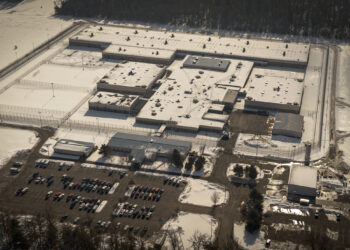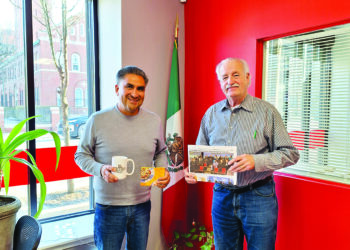If you are not redirected automatically, follow this link.
The Vera and Joseph Dresner Foundation is embedding its operations in Southwest Detroit with the purchase of a 1930s rectory building that will serve as its new headquarters and a nearby community center building it will make available to nonprofits for programs at no cost. Photo credit: Sherri Welch/Crain’s Detroit Business
Leaders of a Southeast Michigan foundation built with assets from real estate investments, are giving new meaning to the old adage, ‘location, location, location.’
The Vera and Joseph Dresner Foundation this week began moving its headquarters from leased space in a sleek, modern office in West Bloomfield Township to a 1930s-era former rectory building it bought in Southwest Detroit.
The move is aimed at having impact beyond grants by embedding itself in one of the communities it supports, the foundation’s leaders said.
The foundation is investing nearly $8 million on the purchase and renovation of that and two other sites in the neighborhood: a grassy area next to the rectory, where St. Andrew Catholic Church once stood, and a building it’s turning into a community and neighborhood resource center that will provide free programmatic space for nonprofits invited into the building.
The foundation’s assets include properties around the U.S. that are leased to retailers to help produce a return and grow the foundation’s assets, but the goal isn’t to make money on its purchases of the new headquarters building and a nearby community resource center in Detroit, leaders said.
“It’s a very strategic move … that really underscores our commitment to investing in the city and supporting local communities in an innovative way beyond traditional philanthropy,” CEO Virginia Romano said.
The foundation’s leaders, including the Dresners’ daughter Lori Dresner, who is board president, and other real estate associates and friends of Joseph Dresner “recognize the significance of having an everyday presence in Detroit as a powerful way to invest in the city’s future,” Romano said.
Foundation gets its start
The Dresner Foundation launched 12 years ago, following the death of its namesake, real estate developer Joseph Dresner. Born to a family of Polish immigrants in Syracuse, N.Y., Dresner moved to Detroit with his family, went on to serve in World War II and to earn a degree from the University of Michigan. He started his career as an accountant before founding Highland Construction Co. with his father and brother in 1950.
“Anyone who worked with Mr. Dresner would tell you that he intuitively knew what to build, how to build it, where to build it, and how to price it,” the foundation said on its website. “He had a firm grasp on the world that he was in, which allowed him to build an impressive fortune with ease and elegance.”
Dresner’s struggle with the blood disorder myelodysplasia gave him an appreciation for the need to fund health research, leaders say on the foundation’s website. He worked with his colleagues and family members to create the foundation to ensure “powerful philanthropy” for years to come.
The Dresner Foundation secured nonprofit status in 2009 and a $1.5 million seed grant in 2011. Following Dresner’s death the following year at the age of 87, its assets rose to $78.5 million and to more than $140 million in 2013 through transfers of cash, real estate interests and stock from Dresner’s estate.
Today, its assets are roughly $150 million —putting it among the 20 largest foundations in Southeast Michigan, according to Crain’s list. Its annual grants, in the $6 million to $7 million range, support health and hunger, youth and family and animal welfare in Southeast Michigan and the Denver area where Lori Dresner lives and also Myelodysplastic Syndromes research nationally.
Grantees include arts and culture organizations, youth groups like Downtown Boxing Gym, Detroit Horsepower, Racquet Up Detroit, the Michigan Humane Society, Karmanos Cancer Institute, Gary Burnstein Community Health Clinic in Pontiac and Oak Park food rescue Forgotten Harvest.
Moving to Detroit
During the pandemic, the foundation ceased its grant program and moved into the arena of emergency funding as a result of high need for food, clothing and other assistance, said board vice president Gary Weisman, co-owner, General Development Co. LLC and a friend of Joseph Dresner.
“We decided as a board to make a more impactful imprint in the Detroit area where we had experienced to that point the vast majority of our granting.
“Because Mr. Dresner was in the real estate business, and several of the board members are real estate professionals, the idea came to us that it might be best to start engaging in real estate projects for the benefit of communities,” he said.
The foundation purchased the former rectory and a nearby community center roughly a mile and a half away in 2020. Both sites are tucked into a Southwest Detroit neighborhood with a mixture of old homes in need of care and others sporting a fresh coat of paint and pots of flowers on the porches.
Purchased from the Catholic Archdiocese of Detroit, the former rectory building at 7066 McGraw Avenue near Livernois and I-94 was part of St. Andrew’s Catholic Church, which stopped holding masses in 2008 after 88 years of operation.
The foundation demolished the former church building in 2021, leaving a grassy area next to the old rectory, something the Dresner Foundation plans to make available to other nonprofits on the campus and to the neighborhood for things like farmer’s markets, Romano said.
Three other human services agencies are operating from the campus around the rectory, a testament to need in the area. Starfish Family Services owns the former school and convent buildings. It occupies the old school with Matrix Human Services and leases the second site to Brilliant Detroit. Detroit PAL also operates a site nearby. All or most are current or past grantees of Dresner, Romano said.
The foundation this week began moving seven employees — programmatic and real estate management staff — to the renovated rectory building with its original tiled flooring and fireplace cove from its 1950s construction in the first-floor conference and meeting rooms and second-floor offices.
At the same time, renovations at the 9,000-square-foot, two-story community center at 3700 Gilbert Street at Gilbert and Clayton streets are expected to be completed by fall. The foundation purchased it from its neighbor there, Saints Peter & Paul Orthodox Christian Cathedral. Detroit-based InToto Studio is the architect on the projects and Ypsilanti-based Phoenix Contractors Inc. is the general contractor.
The foundation hosted a yearlong, community-driven design and planning initiative for the new community center to get feedback on needs from the community, neighboring nonprofits and the church it bought the property from, Romano said. It’s in the process of selecting an anchor nonprofit to provide referrals and services there and to coordinate other nonprofit programs to meet community needs.
It will work with other nonprofits to bring in programs in integrated health and wellness, youth programming and adult areas like GED, English as second language and workforce development. It expects to name the coordinating agency by late summer, Romano said, and to cover the operating costs for the building and to offer rotating programmatic space there to other nonprofits.
“We hope to empower the organizations to focus on our resources on making a measurable impact on communities. So we’re taking care of all of the costs associated with the space,” Romano said.
“We are hoping not only that, perhaps, neighboring nonprofits could utilize it in some way, but also, (that) nonprofit organizations wanting to expand their services in the southwest Detroit community” will come in, she said.
******
Sherri Welch is a senior reporter for Crain’s Detroit Business covering nonprofits, philanthropy, higher education and arts and culture. Before joining Crain’s in 2003, she covered automotive suppliers and tire makers for Crain’s Rubber & Plastics News.

